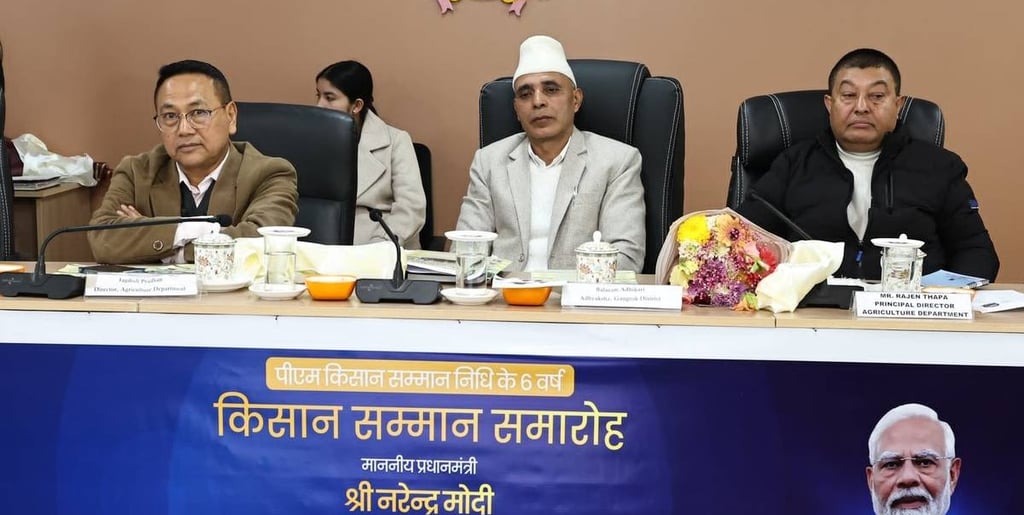PM-KISAN's 19th instalment released at Kisan Samman Samaroh in Sikkim
Rajen Thapa explained the importance of the PM-KISAN scheme, noting that eligible farmers receive ₹2,000 per instalment, amounting to ₹6,000 annually.
LOCAL


The Agriculture Department of the Government of Sikkim, in collaboration with Krishi Vigyan Kendra (KVK), organised the Kisan Samman Samaroh at SAMETI Hall, Agriculture Department, today. The event marked the release of the 19th instalment of the Pradhan Mantri Kisan Samman Nidhi (PM-KISAN) scheme, benefiting farmers across the country.
Prime Minister Narendra Modi addressed the nation live from Bhagalpur, Bihar, announcing the transfer of funds to farmers’ bank accounts under the scheme. The initiative aims to provide financial assistance to small and marginal farmers, ensuring stability in agricultural income.
The event in Gangtok was graced by Balaram Adhikari, Adhyaksha of Gangtok District, as the Chief Guest. Other key officials included Mr Rajen Thapa, Principal Director of the Agriculture Department; Mr Jagdish Pradhan, Director of the Agriculture Department; Jeewan Chettri, Chief Engineer of the Agriculture Department; and Ms Rachna Gurung, Director of SAMETI, Agriculture Department.
Addressing the gathering, Mr Balaram Adhikari commended the Agriculture Department for organising the event. He urged farmers to take full advantage of the schemes provided by both the central and state governments to enhance traditional and modern farming. He also stressed the importance of marketing agricultural produce, assuring that the state government would provide necessary support.
"The land should not remain barren. Farmers must use their fields efficiently to increase productivity," he said. He also encouraged farmers to enrol in the Pradhan Mantri Fasal Bima Yojana (PMFBY), a crop insurance scheme designed to protect against financial losses due to natural calamities, pests, and diseases.
Rajen Thapa explained the importance of the PM-KISAN scheme, noting that eligible farmers receive ₹2,000 per instalment, amounting to ₹6,000 annually. The scheme follows a Direct Benefit Transfer (DBT) system, ensuring that funds reach farmers directly without intermediaries. He urged farmers who have not yet registered to do so to avail themselves of the benefits.
Jeewan Chettri highlighted the Sub-Mission on Agricultural Mechanisation (SMAM), which promotes modern farming techniques. He spoke about financial assistance available for purchasing tractors, power tillers, and other equipment, helping farmers reduce labour costs and increase efficiency. "Mechanisation is the future of farming," he said, urging farmers to adopt advanced methods.
Similarly, Jagdish Pradhan discussed sustainable farming initiatives, including Krishi Unnati Yojana and the Rashtriya Krishi Vigyan Yojana (RKVY), which focus on modern farming, research, and climate-resilient techniques. He also emphasized soil health management, advocating for organic farming and balanced fertilisation.
Rachna Gurung explained the eligibility criteria for PM-KISAN, clarifying that only farmers with cultivable land qualify, while institutional landholders and government employees are excluded. She reaffirmed the government's commitment to ensuring financial assistance reaches the right beneficiaries.
Dr Prakash Sharma, Programme Coordinator at KVK, elaborated on the economic impact of PM-KISAN in providing financial stability to farmers. He also spoke about organic farming in Sikkim, highlighting its benefits in soil health and environmental conservation. "Sikkim is India's first fully organic state, and we must continue to promote sustainable agricultural practices," he said.
